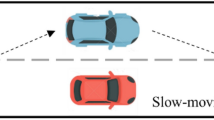Abstract
In this paper, we propose a constrained optimal control approach as a reference trajectory generator for a driving scenario with uncertainty. With a given scenario, this generator can produce a reference trajectory in order to make validations for autonomous vehicle’s decision-making problems. The constrained optimal control problem guarantees obtaining a collision-free trajectory with safety and comfort based on the design of the objective function and the constraints of the vehicle. The uncertainty of environmental information provided by sensors is taken into account, and a stochastic optimization problem is proposed to limit the risk of violating safety requirements. Numerical experiments show that the stochastic model can better ensure the robustness of the obtained solutions.
Access this chapter
Tax calculation will be finalised at checkout
Purchases are for personal use only
Similar content being viewed by others
References
LaValle, S.M., Kuffner, J.J., Jr.: Randomized kinodynamic planning. Int. J. Robot. Res. 20(5), 378–400 (2001)
Gammell, J.D., Srinivasa, S.S., Barfoot, T.D.: Informed RRT: Optimal sampling-based path planning focused via direct sampling of an admissible ellipsoidal heuristic. In: 2014 IEEE/RSJ International Conference on Intelligent Robots and Systems, pp. 2997–3004. IEEE (2014)
Perez, A., Platt, R., Konidaris, G., Kaelbling, L., Lozano-Perez, T.: LQR-RRT: optimal sampling-based motion planning with automatically derived extension heuristics. In: 2012 IEEE International Conference on Robotics and Automation, pp. 2537–2542. IEEE (2012)
Chen, J.: R2-RRT: reliability-based robust mission planning of off-road autonomous ground vehicle under uncertain terrain environment. IEEE Trans. Autom. Sci. Eng. 19(2), 1030–1046 (2021)
Li, Y., Littlefield, Z., Bekris, K.E.: Sparse methods for efficient asymptotically optimal kinodynamic planning. In: Akin, H.L., Amato, N.M., Isler, V., van der Stappen, A.F. (eds.) Algorithmic Foundations of Robotics XI. STAR, vol. 107, pp. 263–282. Springer, Cham (2015). https://doi.org/10.1007/978-3-319-16595-0_16
Likhachev, M., Ferguson, D.I., Gordon, G.J., Stentz, A., Thrun, S.: Anytime dynamic A*: an anytime, replanning algorithm. In: ICAPS, vol. 5, pp. 262–271 (2005)
Likhachev, M., Gordon, G.J., Thrun, S.: ARA*: anytime A* with provable bounds on sub-optimality. In: Advances in Neural Information Processing Systems, vol. 16 (2003)
Strub, M.P., Gammell, J.D.: AIT* and EIT*: asymmetric bidirectional sampling-based path planning. arXiv preprint arXiv:2111.01877 (2021)
Berntorp, K., Olofsson, B., Lundahl, K., Nielsen, L.: Models and methodology for optimal trajectory generation in safety-critical road-vehicle manoeuvres. Veh. Syst. Dyn. 52(10), 1304–1332 (2014)
Bergman, K., Axehill, D.: Combining homotopy methods and numerical optimal control to solve motion planning problems. In: 2018 IEEE Intelligent Vehicles Symposium (IV), pp. 347–354. IEEE (2018)
Prékopa, A.: Stochastic Programming, vol. 324. Springer Science & Business Media (2013)
That, T.N., Casas, J.: An integrated framework combining a traffic simulator and a driving simulator. Procedia Soc. Behav. Sci. 20, 648–655 (2011)
Beal, L., Hill, D., Martin, R., Hedengren, J.: Gekko optimization suite. Processes 6(8), 106 (2018)
Acknowledgement
This work was supported by the French government under the “France 2030” program, as part of the SystemX Technological Research Institute.
Author information
Authors and Affiliations
Corresponding author
Editor information
Editors and Affiliations
Rights and permissions
Copyright information
© 2023 ICST Institute for Computer Sciences, Social Informatics and Telecommunications Engineering
About this paper
Cite this paper
Zhang, S., Hadji, M., Lisser, A. (2023). Optimal Control Based Trajectory Planning Under Uncertainty. In: Martins, A.L., Ferreira, J.C., Kocian, A., Tokkozhina, U. (eds) Intelligent Transport Systems. INTSYS 2022. Lecture Notes of the Institute for Computer Sciences, Social Informatics and Telecommunications Engineering, vol 486. Springer, Cham. https://doi.org/10.1007/978-3-031-30855-0_5
Download citation
DOI: https://doi.org/10.1007/978-3-031-30855-0_5
Published:
Publisher Name: Springer, Cham
Print ISBN: 978-3-031-30854-3
Online ISBN: 978-3-031-30855-0
eBook Packages: Computer ScienceComputer Science (R0)



